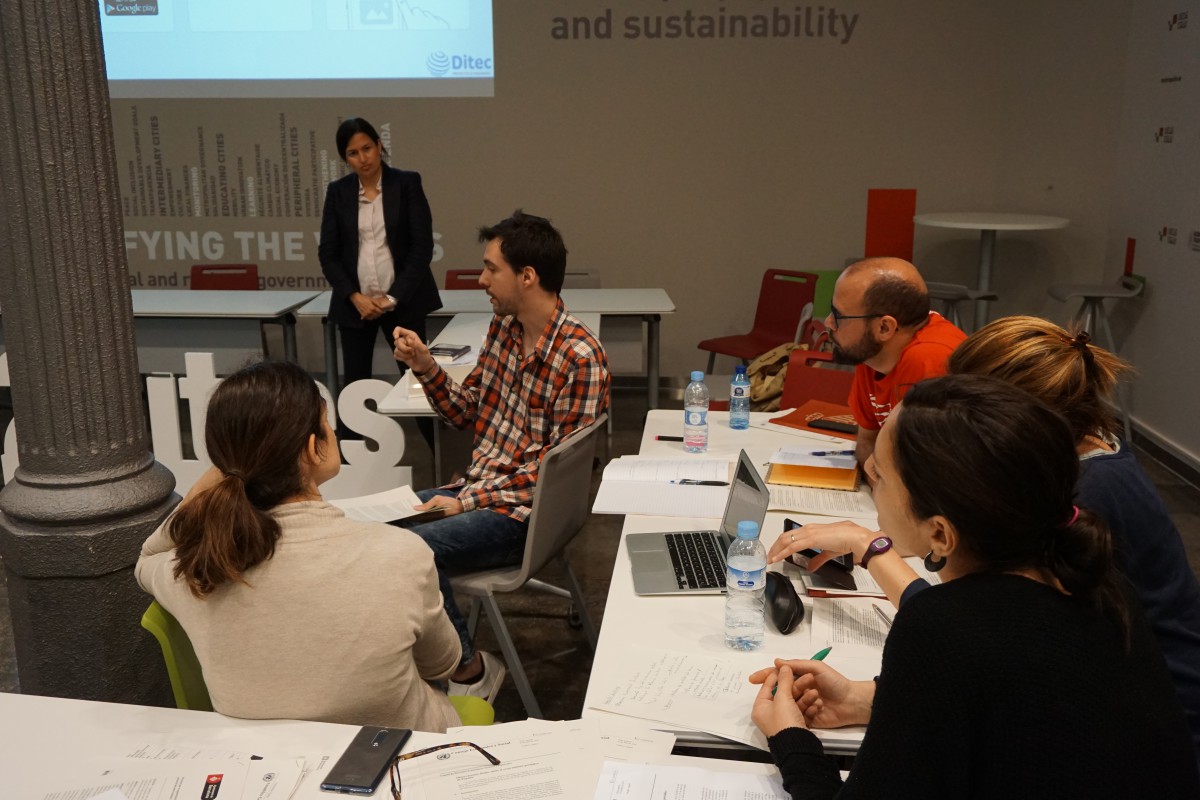Last 22 and 23 May, the Committee co-organized the first edition of a training session on how the work of local human rights defenders and civil society organizations can benefit from international mechanisms for human rights protection. This event was open to more than twenty human rights defense organizations based in the Catalan capital, and was held in partnership with Barcelona’s Department on Citizenship Rights and Diversity and the Office of the UN High Commissioner for Human Rights (OHCHR).
Strengthening the link between local and international mechanisms for human rights protection
As recalled by Marta Franco, officer at the OHCHR and trainer in charge of facilitating session, the existence of a strong network of civil society and grassroots associations is one of the best guarantees for bringing about the idea of “human rights cities”. The training session therefore began by identifying how the work of Barcelona local human rights defenders could benefit from the human rights protection mechanisms offered in the UN framework.
It was soon noted, however, how the amount of local entities that make use of these mechanisms tends to be limited, often due to a lack of knowledge or to the perception that they lay too far from local realities. Precisely, and due to their proximity to the urban fabric and local struggles, municipal authorities can play a key role in providing a meaningful bridge between those two sides of the equation.
They can thus connect local civil society to multilateral institutions through learning and awareness-raising, strengthening in perspective the situation of human rights from the bottom-up.
Participants to the session assessed the role of institutions such as the OHCHR, the Human Rights Council or the Committee on Economic, Social and Cultural Rights, as well as other UN mechanisms related to human rights. This soon showed the possible links that civil society representatives could establish with concrete UN mechanisms, such as the Universal Periodic Review or the establishment of strategic alliances with Special Rapporteurs and Working Groups.
A session focused on empowering local entities and sharing experiences
On the second day of the session, both trainers – Marta Franco (ACDH) and Clara Marsan (Centre de Recursos en Drets Humans, Barcelona) – gave an overview of Spain’s recent response to various UN human rights mechanisms. This allowed local associations to gain practical knowledge on the use of OHCHR’s webpage to advance their agendas by taking advantage of its procedures and working documents.
Afterwards, several local associations with consolidated experience in the use of UN Human Rights mechanisms presented their own work and successes achieved on the subject. This showcased the importance of rising local ownership, as the outcomes achieved by participants were numerous and significant. Among participating speakers, the session counted with Catalonia’s Ombudsman, the Human Rights Institute of Catalonia, the Observatory on Economic, Social and Cultural Rights and the Observatory on Human Rights over the Penal System – SIREVOCI.
Group work and exchange between participants was predominant throughout the session. This enabled every participant to raise awareness on his or her own work, as well as to learn from other experiences, explore shared agendas and joint action with other associations for the coming months. Several agendas focused the attention of participants: refugee and migrant rights, fight against homophobia and racism or the collective rights of minorities such as Roma people.
Trainers also paid attention to individual work, favoring a personalized approach to best match every association’s expectation. After the session, it was clear that, regardless of its size or scope, any local association working for human rights can benefit from UN mechanisms.

Local governments and civil society, co-creating the "Human Rights City"
Barcelona’s example – a city that is engaged in promoting human rights locally through collaboration with civil society – is not an isolated case of how municipalities and local associations can cooperate to build human rights cities. Indeed, many other local governments have shared their strategies for promoting human rights in the framework of our Committee.
Madrid, has promoted its Strategic Plan for Human Rights in the city after a long-term collaboration with local civil society; Gwangju carries out paramount human rights policies by placing inhabitants' participation in the center of policy-making; and Montevideo benefits from the dynamism and capacity of grassroots associations to realize the right to housing.
The Committee has begun a review on how cities signatories of the European Charter of Human Rights in the city have implemented this landmark document twenty years after its formal adoption. We invite local authorities who would like to share their experience on the subject, or who would be interested in setting up similar training sessions to contact the Committee.

